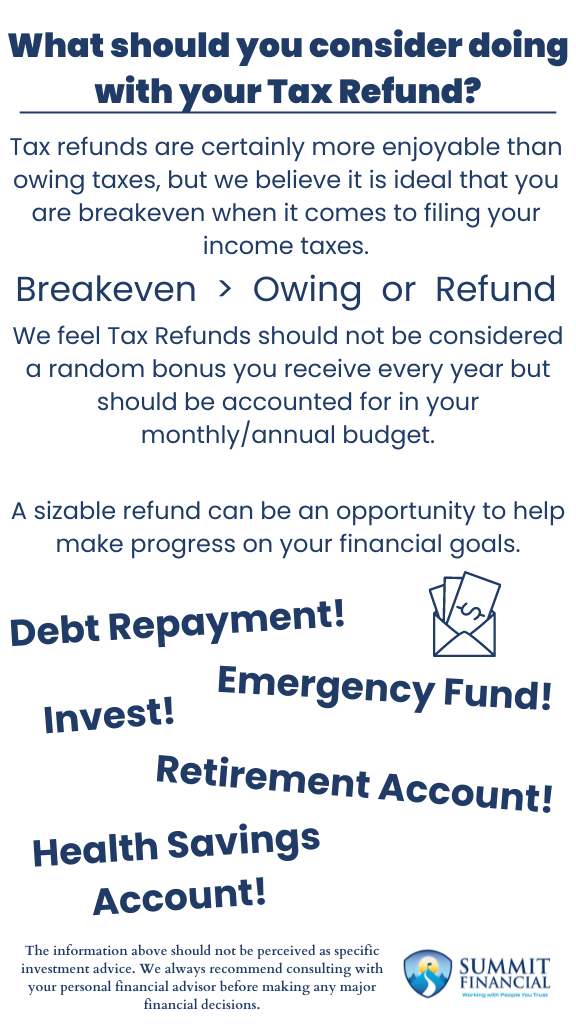As we approach the tax filing deadline for 2023, we thought it would be a good idea to highlight different ways you can use your tax refund to help progress on your financial goals. While many individuals hope for a large refund every Spring, receiving a significant refund may not be the optimal outcome when filing your income taxes.
For those seeking an update on the 2023 tax code, revisit our previous blog post here.
Understanding Tax Refunds
A tax refund means that the government owes you money because you overpaid during the year. Whether your tax payments came from paycheck withholdings, self-employed payments, etc., a refund means that you gave the government more than what was needed. The government takes the excess payments and sends them back.
You are potentially not rewarded for overpaying, and you may not receive interest on the money they held onto depending on your situation and the timing of payments. However, if you do not pay enough or if you pay your taxes late, the government will surely penalize you for it. It is almost as if tax pre-payments are primarily a one-sided system that usually benefits the government, not the taxpayer.
Striving for a Tax Breakeven: Why It Matters
Ideally, we believe your optimal income tax situation is the breakeven point, in which no taxes are due, and you are not owed a refund. It is almost an impossible task to perfectly hit the breakeven point, but efficient tax planning can certainly bring you closer to it.
You can speak with your employer about withholding different amounts; your accountant can run estimates to calculate accurate pre-payment amounts, etc. There may be strategies that can help get you closer to the ideal breakeven point.
This breakeven means that you held onto the money that you were entitled to all year and the government received their portion. There was no interest-free loan to the government and you still avoided fees, penalties, and the unfortunate tax bill that may come with owing. We feel tax refunds should not be considered a random bonus you receive every year but should be accounted for in your monthly/annual budget.
However, if you do receive a refund, especially if it is sizable, what should you consider doing with it? Next, we will discuss some ideas that can help boost your financial plan. Please note, that everyone has a different personal situation, so it is important to consult with your financial advisor before committing to a large financial decision. Your best course of action may differ from the ideas below simply because you are in a different financial position.

Reducing High-Interest Debt
First, one idea for consideration when you have any excess cash is to pay off high-interest debt. This is primarily credit cards as some of these rates can be 20% or above. This high level of interest makes your expenses that much larger and that much more draining on your cash flow.
We believe it is important to keep high-interest debt at a minimum so you can take those monthly payments and apply them to a more beneficial area of your finances. A large tax refund can be an opportunity to help pay off some, if not all, of your higher interest-rate debt.
For those seeking guidance on debt repayment strategies, revisit our previous blog post here.
Strengthening Your Emergency Fund
Next, if you do not have the debt mentioned above, you should consider prioritizing an efficient emergency fund. This is a safety net of 3-6 months’ worth of expenses that is set aside and only accessed in case of an emergency.
Whether it is medical bills, auto repairs, unemployment, etc., an emergency fund should be available to help relieve these financial surprises. The specific amount you need depends on your specific situation and risk tolerance.
A tax refund can be used to help replenish an emergency fund if you need to use the funds recently, or the tax refund can be one way to help start your emergency fund with a one-time contribution.
For those seeking guidance on emergency funds, revisit our previous blog post here.
Investing in Your Future
Lastly, once you have a sufficient emergency fund established, you could consider using a tax refund to contribute to an investment account, such as a retirement account or a health savings account. Achieving your financial goals may be dependent on how much you are able to save and invest. Sure, you could spend your tax refund on a vacation or a new toy, but will those get you closer to your financial dreams?
We believe if your refund is taken and invested, you are giving it the chance to grow over the years and potentially be worth more in the future. We believe the more you can save and invest, the stronger your financial plan has the opportunity to be, so this is an option to consider if you receive a tax refund this Spring.
What to do with your Tax Refund- Key Considerations
- Tax refunds are certainly more enjoyable than owing taxes, but we believe it is ideal that you are breakeven when it comes to filing your income taxes.
- We feel Tax Refunds should not be considered a random bonus you receive every year but should be accounted for in your monthly/annual budget.
- A sizable refund can be an opportunity to help make progress on your financial goals.
Financial Planning and Review Meeting
If you have any questions about your investment portfolio, tax strategies, our 401(k) recommendation service, or other general questions, please give our office a call at (586) 226-2100. Please feel free to forward this commentary to a friend, family member, or co-worker. If you have had any changes to your income, job, family, health insurance, risk tolerance, or your overall financial situation, please give us a call so we can discuss it.
We hope you learned something today. If you have any feedback or suggestions, we would love to hear them.
Best Regards,
Zachary A. Bachner, CFP®
with contributions from Robert Wink, Kenneth Wink, and James Wink
If you found this article helpful, consider reading:
- Estate Planning for Blended Households
- Flexible Side Hustles
- Examining Pre-Tax and Post-Tax Contributions
Sources:


